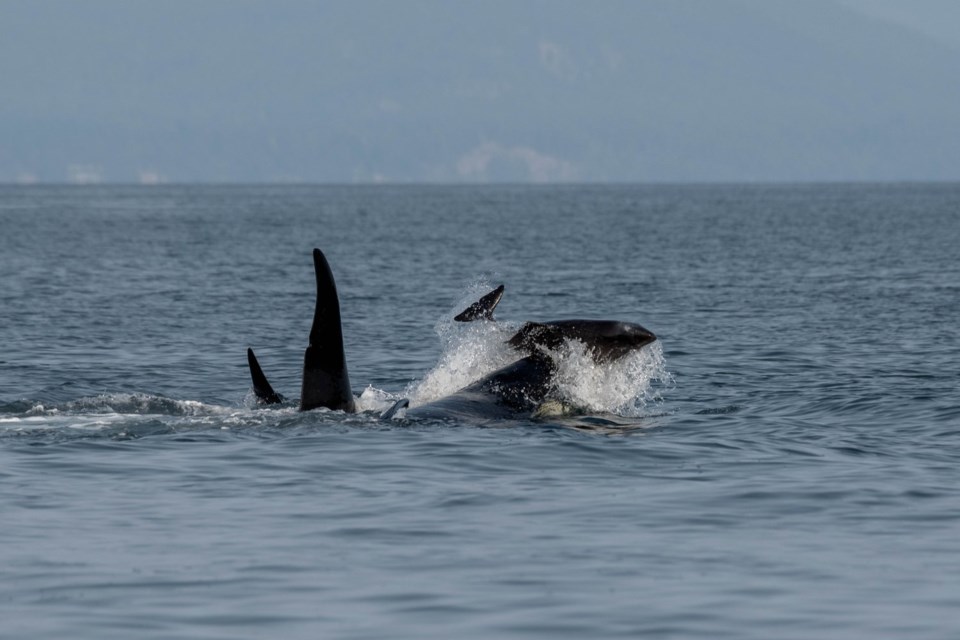Have you ever seen an orca whale? How about a pod of them on the hunt?
I was blessed to witness such a thing on Sept. 8, when I spontaneously decided to fit a whale-watching excursion into my weekend Nanaimo trip. At first it felt like an inauspicious choice: I arrived at the dock just 10 minutes before the day's last tour was scheduled to depart, and hesitation over paying the $189 fee plus tax cost me a few more precious minutes.
Man, was I glad I ponied up.
After some time in open water, our guide and captain threw the zodiac into high gear. They'd received reports of orcas in the vicinity and were determined not to let us—or themselves—down. We reached the designated area before long, spotting the tall black dorsal fins of our intended subjects.
But then we saw something else: a much more diminutive grey creature. A harbour porpoise making a desperate bid for survival.
It would not be hyperbole to say that a cinematic action scene unfolded before our eyes. The two largest orcas—a mom named "Volker" and a subadult male dubbed "Inky"—hounded and encircled the porpoise. Their evident goal was to allow the smallest whale, a young female known as "Crinkle," to make the kill. It was a family business.
Tails splashed as jet-black forms slashed through the ocean. Crinkle launched her quarry well clear of the water at one point, barely missing what could have been a fatal bite. Eventually the porpoise went under and didn't rise again. The orcas began to feast.
Our guide, a woman named Aly Kohlman, remarked that the events we'd just witnessed might seem cruel. However, she encouraged us to remember that they were a normal part of nature. Predators need to eat too, and their hunts play a key role in regulating ecosystems.
Be natural
It's easy for us humans to anthropomorphize the beasts, environments and goings-on of the natural world. We deem some species, like dolphins and dogs, to be adorable, while others like spiders and snakes are considered gross by many. We're tempted to take sides based on what feels right.
Look up a bunch of nature videos online, and you'll inevitably read comments that express empathy towards prey animals ("why is no one helping the poor deer?"). Myself and some of my friends grew up watching the Disney flick Bambi, and we were vaguely traumatized when the titular character's mom is shot offscreen by a hunter.
However, nature is no Disney movie. Instead it's chock-full of violence as predators at all levels of the food web try to kill their quarry for survival. If they don't, ecosystems gradually degrade as those prey animals overpopulate.
Besides, isn’t the idea of a tiger starving to death alone because it botched one too many hunts rather depressing too? Prey aren't the only animals worthy of our pathos.
You can't judge the quality of a creature based on appearance or feel. Spiders and centipedes could effectively play the role of pest control in your home, yet lots of people (including myself, admittedly) don't want them around. Nonetheless, the skin-crawling feelings of disgust they might induce is not representative of what they contribute to their environment.
Consider also something more inanimate, like weather. The vast majority of Whistlerites eagerly await snowfall and the recreation it makes possible, but winter storms are also life-threatening for those they catch out in the open. Even ordinary commutes can become perilous endeavours when our roads become inundated with black ice.
The Sea to Sky is full of capable adventurers who understand this, of course. Exploring the outdoors is risky, and managing risk in tandem with other people is needed for success (in addition to being a valuable bonding experience for those open to it). Yet the call of adrenaline may tempt us closer to the razor's edge, and strong feelings may obscure the big picture.
It's normal for us to romanticize nature—after all, who doesn't feel something when they gaze upon a majestic sunrise? Having said that, my recent whale-watching trip was a reminder that the natural realm does not adhere to the boundaries of human comfort and moral value. In order to truly appreciate its beauty, we must also take its brutality in stride.




